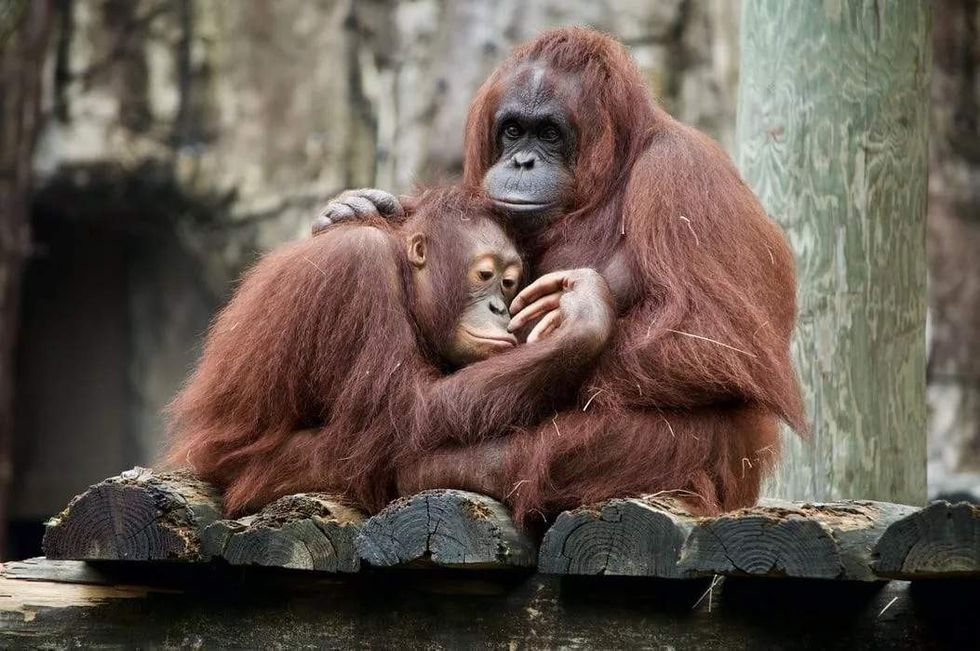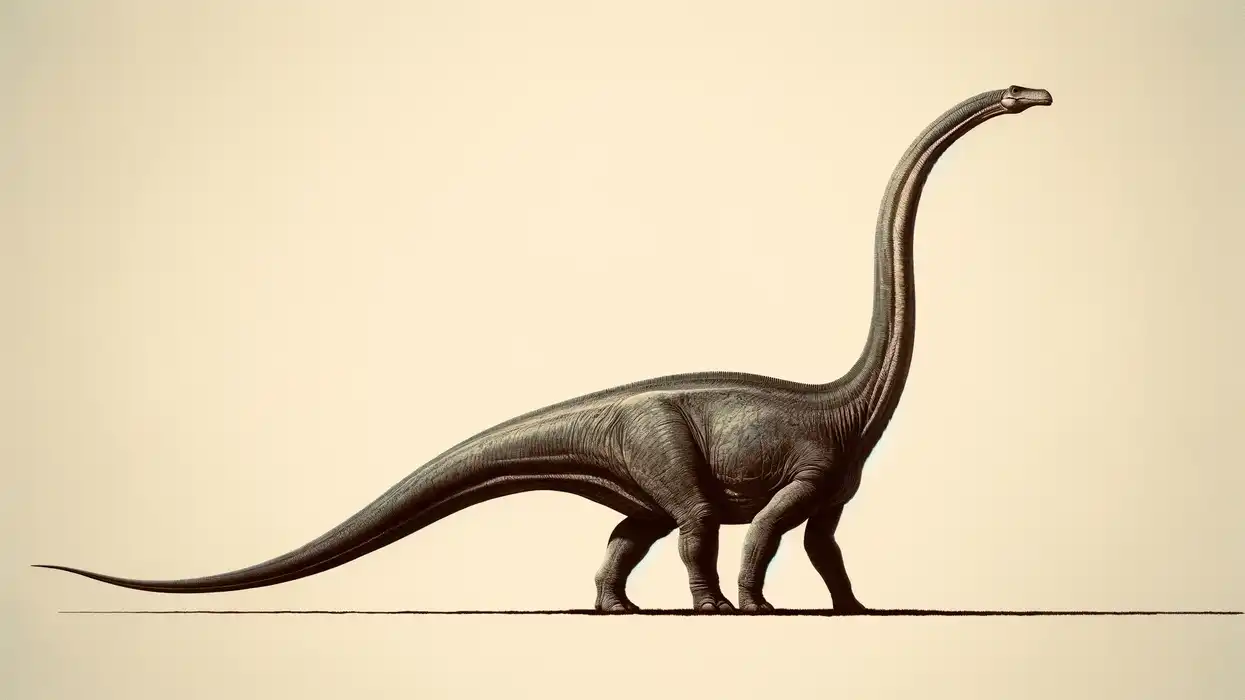The orangutan, also spelled orang-utan, is a majestic animal known for its vibrant fur, intelligence, and super friendly personality. They are said to be close relatives to humans, so much so that orangutan means 'person of the forest' in Malay.
They are found in Sumatra, Borneo and Indonesia. The orangutan scientific name is Pongo, and there are three types of orangutan: Pongo pygmaeus, Pongo abelii and Pongo tapanuli.
Orangutans play a very important role in keeping forests healthy as they disperse seeds from the fruit and plants they eat, allowing for more plants and trees to grow. Now, because of palm oil production, orangutans are becoming an increasingly endangered population.
It is so important to learn about these awesome creatures to protect them and work towards their conservation. The forest and the world need these critically endangered apes.
Take a deeper look into the world of our loveable rusty-colored friends with these orangutan facts for kids and learn more about these fascinating great apes. If you enjoy this article check out facts about the Bornean orangutan and the Sumatran orangutan too.
Orangutan Interesting Facts
What type of animal are orangutans?
Orangutans are part of the great apes group, alongside chimpanzees, gorillas, and bonobos. They are the only great apes living in Asia.
What class of animal do orangutans belong to?
Orangutans belong to the mammal class, also known as Mammalia.
How many orangutans are there in the world?
The current population of orang-utans in the wild is around 120,000. There are also some orangutan apes living in captivity around the world.
Where does an orangutan live?
They spend almost their entire life living in trees and they sleep in nests at night.
What is an orangutan's habitat?
Lowland rainforests and tropical, mountain and swamp forests are orangutans' natural habitats. They can be found swinging between trees in tropical rainforests in the South East Asian islands of Sumatra and Borneo in Indonesia.
They can only be found in the wild on these two islands. Unfortunately, over 60% of their forest habitats have been destroyed over the last four decades.
Who do orangutans live with?
Orangutans are semi-solitary, meaning that once they have become fully-fledged adults, they live mostly alone. Adult females live with their offspring and adult males spend 90% of their time alone.
How long do orangutans live?
The average orangutan lifespan is 30 - 45 years in the wild or more than 50 years in captivity.
How do they reproduce?
Reproduction occurs through sexual contact, often initiated by females who choose dominant males with their cheek pads fully developed. Males often have multiple mates and females often reproduce for the first time when they are between 10 and 15 years of age.
Females normally give birth four or five times during their lifetime. They give birth to their young after a nine-month pregnancy, just like us humans.
What is their conservation status?
They are a Critically Endangered species. This means that they are likely to become extinct soon unless we protect them.
In fact, all three types of orangutans are classified as Critically Endangered: there are less than 104,700 Bornean orangutans; 7,500 Sumatran orangutans; and only 800 Tapanuli orangutans, making them the most endangered of all the great apes.
Less than a century ago, there were more than 230,000 orangutans in the wild, and there has been a 97% loss in orangutan populations since 1903.
Orangutan Fun Facts
What do orangutans look like?
Orange in color, orangutans are a powerful, but critically endangered, species. They have powerful long arms that help them swing through the forest trees.
Orangutan hands and feet look very similar to our own to help them to grip onto things and make it easier to devour food. Male orangutans are also extremely easy to recognize with their large cheek pads.
How cute are they?
Orangutans are extremely cute and totally unique! They are easily recognized by their beautiful reddish-orange fur.
How do they communicate?
Orangutans use both verbal and non-verbal communication. As they are semi-solitary animals, mostly use non-verbal communication, such as hand gestures. Scientists have described these gestures to be like charades.
Orangutans use verbal communication to relay messages long-distance, such as a warning of an incoming storm. Normally this sounds like a howl or bellow that can be heard for miles and miles. Did you know that orangutans laugh, just like we do?
How big are orangutans?
Orangutans are nature's biggest tree-dwelling (arboreal) mammals, they can be as big as adult humans! Even if they are a similar size to humans, they are up to seven times more powerful than us.
The Sumatran orangutan is on average 32.7 in (83 cm) tall but the Bornean orangutan is a little bigger reaching up to 4.6 ft (1.4 m) in height. Adult males are also normally twice the size of adult females.
How fast can an orangutan run?
If orangutans did run, they wouldn't run very fast! They have short legs and flat feet that are not great for running. They much prefer moving through the forest canopy and, with their long arms, they are much better at swinging through the trees of the forest.
How much does an orangutan weigh?
Sumatran orangutans typically weigh about 99 lb (45 kg) when fully grown. Bornean orangutans weigh even more and can reach up to 220 lb (100 kg). The male orangutan weight is on average double the female weight.
What are their male and female names of the species?
Male orangutans and female orangutans do not have separate names. However, it is very easy to spot adult males due to their much larger side and cheek pads.
What would you call a baby orangutan?
A baby orangutan monkey is called an infant, just like a human baby.
What do they eat?
The orangutan diet consists of wild fruit, bark, branches, leaves, and flowers from the forest. Orangutans feast on 300 different types of fruit all grown wild in the rainforest. They also eat meat sometimes.
Are they aggressive?
Orangutans are mostly not aggressive towards each other and to humans. Adult males can be aggressive towards each other from time to time, but orangutans are a mostly solitary species and stay out of each other's way.
Would they make a good pet?
Although they are absolutely adorable, orangutans do not make good pets. Keeping one as a pet is actually illegal and the pet trade is one reason leading to their extinction. An alternative to having an orangutan pet is to sponsor one, ensuring it has a happy and safe life.
Did you know...
Orangutan pronunciation is: orang- uh-tan.
The orangutan is humankind's closest relative sharing 97% of the same DNA. This is why they share a lot of similarities with humans. Like humans, orangutans have four fingers, fingernails, and a thumb on each hand.
Orangutans have a long arm span reaching up to 7.2 ft (2.2 m) from fingertip to fingertip. Their arms are actually one and a half times longer than their legs. When standing, their arms almost touch the ground. They are the perfect arms for swinging through trees! They also use their feet to eat.
Young orangutans stay with their mothers until they reach about seven years old. They learn everything they need to know about being an orangutan from their mother. Female orangutans normally have babies every seven to nine years because of this long mothering period.
Orangutans sleep in nests. They can create these nests in about 10 minutes by collecting branches and, sometimes in wet weather, they gather some extra branches to make a roof. Orangutans make a new nest every night, just like us humans making the bed!
Some orangutans use tools, such as sticks, to get small insects out of hard-to-reach places.
They love to eat durian, a smelly and spiky fruit.
The world's only recorded albino orangutan, Alba, was released back into wild Bornean forests after months in captivity. She is heavily monitored because, as she is one of a kind, many wildlife traffickers are after her to sell on the black market.
12,000 years ago, orangutans could be found in a wider area including Java and China.
Clyde the orangutan became a movie star playing Clint Eastwood's sidekick in the 1978 movie 'Every Which Way But Loose'.
You can get a closer look at orangutans in conservation areas and rehabilitation centers in Borneo and Sumatra.
Types of orangutan
There are three species of orangutan: the recently discovered Tapanuli orangutan (Pongo tapanulienis), the Sumatran orangutan (Pongo abelii), and the Bornean orangutan (Pongo pygmaeus).
Why are orangutans faces flat?
Mature adult male orangutans have cheek pads that are also known as flanges, which make their heads look much larger than those of a female orangutan. Males develop these cheek pads from 13 years of age.
No one is completely sure what the purpose of the flanges on the orangutan face is but some say they signify dominance over other males. Some also say that females consider the best cheek pads when looking for a mate.
Why do poachers kill orangutans?
Unfortunately, more than 2000 orangutans are killed every year. The main reason that orangutans are killed is for the production of palm oil. To grow palm oil, the forest needs to be removed to make way for palm oil plantations. The forest ends up being destroyed in a process called deforestation, destroying orangutans' habitat and also killing them.
Poachers are also after young orangutans to sell illegally as pets. In their hunt for finding baby orangutans, they often end up killing their mothers. If things don't change soon, if we do not stop destoying the orangutan habitat and we don't work on their conservation, we may lose these amazing creatures forever.
Here at Kidadl, we have carefully created lots of interesting family-friendly animal facts for everyone to discover! If you enjoyed these orangutan facts you can learn more about some other mammals including the gorilla, or the capuchin monkey.
You can even occupy yourself at home by drawing one on our orangutan coloring pages.










